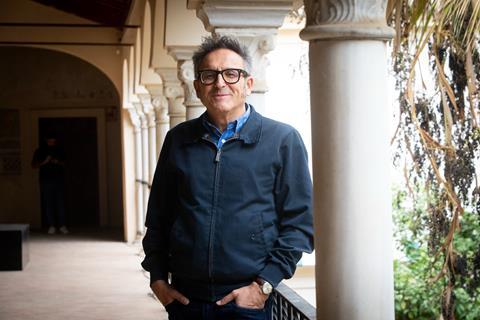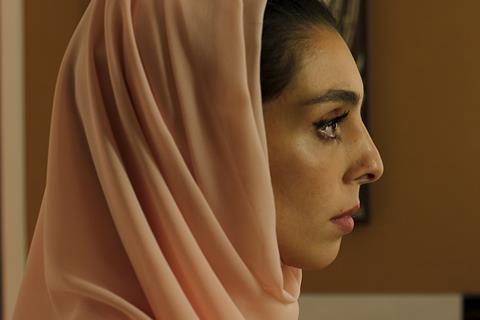
Other People’s Children by French director Rebecca Zlotowski opens the 19th edition of Seville European Film Festival (SEFF) in Spain today (November 4) as the festival prepares to showcase a melting pot of independent European cinema to Spanish audiences.
SEFF includes nine competitive sections and three non-competitive strands. The official selection will host the Spanish launch of films including Frederick Wiseman’s A Couple, Aleksandr Sokurov’s Fairy Tale, Pietro Marcello’s Scarlet, and Joanna Hogg’s The Eternal Daughter. Prizes on offer include the Golden Giraldillo, for which the Spanish distributor of the winning film will receive €35,000 towards the Spanish release.
A second key showcase is The New Waves, which showcases innovative new European films, both fiction and non-fiction. The line-up includes Pierre Földes’ animation Blind Willow, Sleeping Woman, María Antonia Cabot’s Sóc Vertical Però M’agradaria Ser Horitzontal, and Sergei Loznitsa’s The Kiev Trial.
SEFF is renowned for the emphasis it places on the cultural value of cinema and is showing the restored versions of Douglas Sirk’s La Habanera (1937) and Lumière (1976). The latter is the obscure directorial debut of celebrated actress Jeanne Moreau.
On the industry side, the second MERCI Seville Independent Film Market, organised with Spanish independent distributors association Adicine, will bring together Spain’s leading indie distributors for screenings and meetings and panel conversations with Spanish exhibiitors. Distributors taking part include A Contracorriente, Avalon Distribución, Bteam Pictures, Caramel Films, DeAPlaneta, Elástica Films, Filmax, Golem Distribución, Tripictures, Vértigo Films and Wanda Visión.
The festival’s artistic director Jose Luis Cinefuegos talks to Screen about how he believes Seville can help in the effort to keep European arthouse cinema alive and thriving.
How would you describe Seville’s role in the Spanish film calendar?
At the moment, we festivals have the idea we are part of a working chain to enable films, especially independent films, have visibility and, in our case, European films. This is because the situation in theatres is quite different from what it was about five years ago. Now we are a fundamental pillar. That said, we have always tried to cover gaps that others did not cover, at least in Spain, and always with an international vision, focusing on distribution, exhibition, and audiences.
We feel part of the team that is the European film industry. We also directly support the circulation and visibility of the films, which is significant, as the total of the prizes amounts to €160,000.
What would you like to highlight about this year’s edition?
Everything related to the recovery of European film heritage in the section ‘Towards Another History of European Cinema’, in collaboration with film libraries and archives throughout Europe. They include the Spanish Film Library itself, the National Institute Film Hungary, the Greek Film Archive, the Friedrich Wilhelm Murnau Foundation and the Eye Filmmuseum in Amsterdam.
It has been a pleasant surprise to see how it is attracting attention, which makes me think the need to vindicate the memory and history of European cinema has been unfairly neglected. In this sense, I believe we are all sailing together. The European Film Academy, for instance, has set up a new heritage department this year led by Pascal Edelmann. We must not surrender ourselves solely to the hottest contemporary works.
Does this theme continue into the public talks strand, ‘Essential Voices’?
Yes, the festival will offer public conversations with filmmakers who represent key references in contemporary European cinema such as Alexandr Sokurov, Michel Ocelot, Signe Baumane, Juan Antonio Bayona or Alex de la Iglesia. Always guided by the idea of vindicating European cinema heritage.

What are some personal highlights from this year’s line-up?
I am very pleased to include two female directors who have won new director prizes [at festivals this year]:Iraq’s Kurdwin Ayub with Sonne in Berlin, and France’s Alice Diop with Saint Omer in Venice.
I would also like to mention docu-fiction Gigi La Legge by Alessandro Comodin in the New Waves showcaseand Helena Wittmann’s Human Flowers Of Flesh.
There are also some Spanish productions making their world premiere in Seville. Néstor Ruiz Medina’s first feature 21 Paradise is screening here and is then is headed to Tallinn Black Nights in Estonia. Also, Nacho A. Villar and Luis Rojo’s La Mala Familia, the opening film of New Waves, which screen in Rotterdam in the Bright Future sidebar.
Please tell us a bit more about the MERCI Independent Film Market this year.
This is the other axis of Seville. It’s very gratifying to welcome more than 100 Spanish exhibitors to Seville to watch movies and interact with the distributors. We organise the MERCI alongside ADICINE, following the model of Leipzig’s trade event Filmkunstmesse.
It works well because it goes beyond the private screenings. We also have panels and talks with professionals from ComScore and European arthouse cinemas, which we organise in collaboration with CICAE, the international confederation of arthouse cinemas. We will explore new strategies for establishing audience loyalty. One of the concerns we will tackle this year is the decline of cinema coverage in the mainstream media. I believe these forms of media should be made aware we need them for cinema to maintain its social visibility.
Do you have plans to expand the industry activities?
We will begin with Seville Cinema Lab in 2023. Along one side we will try to boost co-production with a specific country and we are already working with France’s CNC for that. A second part will be devoted to analysing new possible marketing strategies for distribution. This will be co-organised with Spain’s national film body ICAA, and backed by Next Generation Funds [within Spain’s post COVID Recovery, Transformation and Resilience Plan]
It has been said that theatrical and platforms need to learn to coexist. But the exhibition sector is now in need and that need should be met with the help of major European cinema institutions. Do you agree?
Yes. I would add simple monetary aid would be useless. Exhibition needs help, but not an artificial form of aid simply designed to keep theatres open but the discovery of new models to reach audiences. Perhaps some methods we are still applying belong to the last century. These are the aspects that MERCI is going to tackle.

























No comments yet